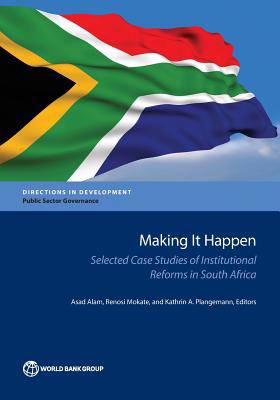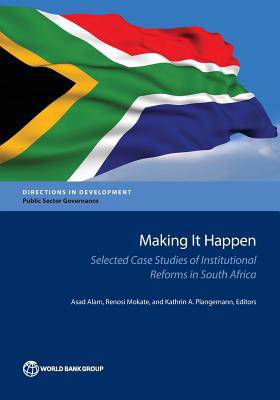
Bedankt voor het vertrouwen het afgelopen jaar! Om jou te bedanken bieden we GRATIS verzending (in België) aan op alles gedurende de hele maand januari.
- Afhalen na 1 uur in een winkel met voorraad
- In januari gratis thuislevering in België
- Ruim aanbod met 7 miljoen producten
Bedankt voor het vertrouwen het afgelopen jaar! Om jou te bedanken bieden we GRATIS verzending (in België) aan op alles gedurende de hele maand januari.
- Afhalen na 1 uur in een winkel met voorraad
- In januari gratis thuislevering in België
- Ruim aanbod met 7 miljoen producten
Zoeken
€ 45,45
+ 90 punten
Omschrijving
South Africa has achieved a lot on its path of socio-economic transformation since the end of Apartheid in 1994. While many challenges remain to foster inclusive growth to address the triple challenges of unemployment, poverty, and inequality, some innovative approaches have been used to build more inclusive public institutions. These have helped to expand service delivery, strengthen quality, and improve the lives of millions of South Africans. Although much is known about the motivation and nature of the policies and institutional changes that drove this transformation, very little is known of the manner in which they were executed. With this book, Making It Happen, From Policies to Implementation, we offer a selection of twelve case studies to illustrate how policies and institutions were developed and implemented to improve specific public services. Done through interviews with senior policy makers, the book captures the how to of executing these policies in a variety of areas including increasing budget transparency, developing an intergovernmental fiscal system, strengthening tax administration, developing a modern performance monitoring and evaluation system, expanding HIV/AIDS treatment, reforming the social transfer system, strengthening statistics, creating a modern national identity system, developing a system for the management of biodiversity, modernizing the national road network management, developing the framework for renewable energy, and the formulation of the country s much lauded constitution. Tracing a twenty year journey of transformation, this book places particular emphasis on recording the design of these reforms and endeavors to shed some light on the decision-making processes. In particular, it attempts to provide insight on the trade-offs policy makers faced, and the sequencing and complementarities among the various reforms. It finds leadership at different levels, adoption of pragmatic and innovative solutions, and the focus on results as among the key drivers in implementing these changes. This book is primarily intended to enhance knowledge exchange by exporting South Africa s development experience to the world. It is a product of the country s Knowledge Hub, developed in partnership with the World Bank Group, to provide evidence-based solutions for enhancing service delivery."
Specificaties
Betrokkenen
- Auteur(s):
- Uitgeverij:
Inhoud
- Aantal bladzijden:
- 248
- Taal:
- Engels
- Reeks:
Eigenschappen
- Productcode (EAN):
- 9781464807688
- Verschijningsdatum:
- 15/04/2016
- Uitvoering:
- Paperback
- Formaat:
- Trade paperback (VS)
- Afmetingen:
- 178 mm x 254 mm
- Gewicht:
- 439 g

Alleen bij Standaard Boekhandel
+ 90 punten op je klantenkaart van Standaard Boekhandel
Beoordelingen
We publiceren alleen reviews die voldoen aan de voorwaarden voor reviews. Bekijk onze voorwaarden voor reviews.









